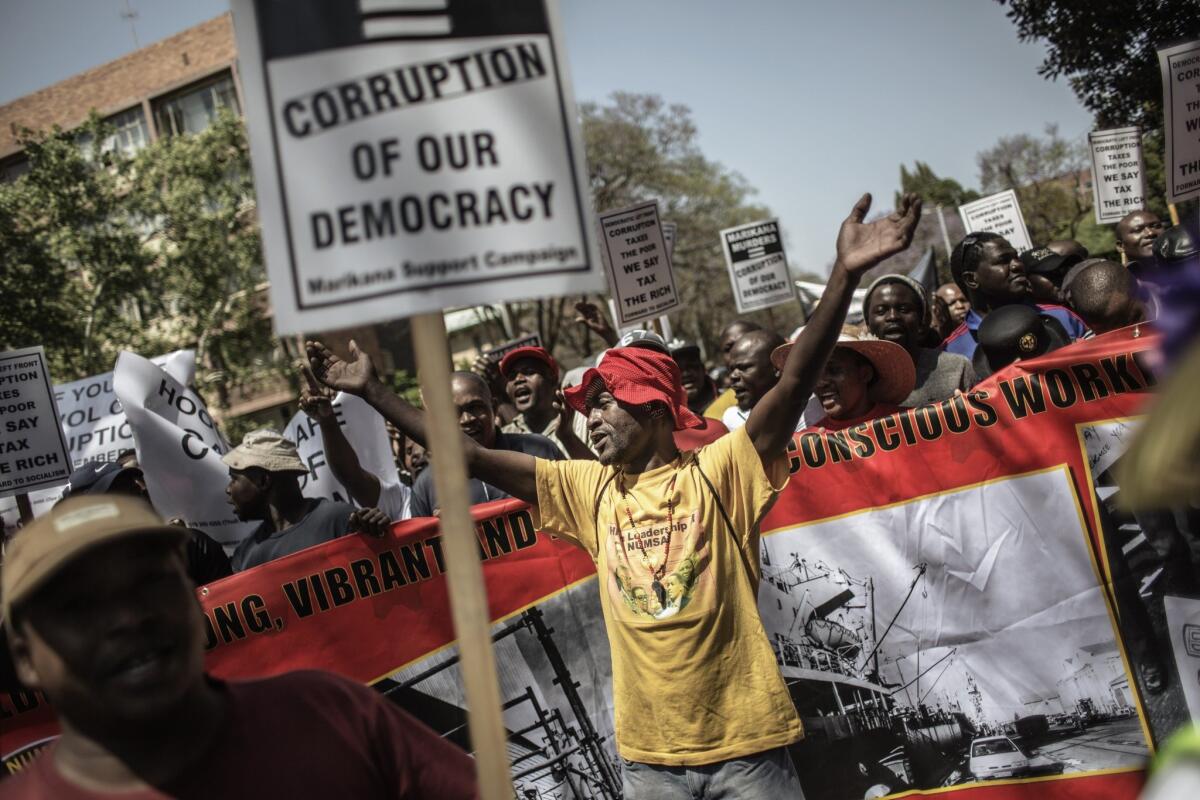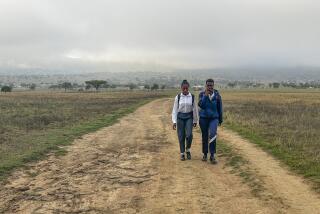In South Africa, even the schoolchildren pay bribes

Anticorruption activists march against corruption Wednesday in Pretoria, South Africa.
Reporting from Johannesburg, South Africa — The corruption habit begins early in South Africa, with children bribing school gate guards a few cents to let them out to buy candies.
“You pay a bribe and you get away with it. It becomes a habit. Most people say corruption is part of our culture,” said Lucky Menoe, an activist with a South African anticorruption organization, Corruption Watch.
Menoe works with children who report their experience paying bribes at schools – to get a copy of an exam paper in advance, or to pass a subject. He runs programs to try to educate them to say no to requests for bribes.
In a sign of public anger over rising government corruption, a public coalition of unions, anticorruption activists, legal rights groups, churches, organizations representing the poor, homeless people and opposition parties led protest marches against corruption Wednesday in Pretoria and Cape Town – the first mass anticorruption protests since the governing African National Congress took power in 1994.
The most common brush with corruption comes on roadsides where police, their badges artfully hidden, pull over drivers for minor offenses and demand a “cold drink” or to “buy me tea.”
But in recent years, corruption has crept into almost all areas of life, according to David Lewis, director of Corruption Watch.
“The government says this is a leafy suburbs problem. It’s not,” he said, referring to wealthy neighborhoods. “People are reporting it across the board. It has increased significantly.”
He said people have to pay bribes to hospital staff, school principals and teachers, housing authorities, and for permits, documents, licenses and contracts from government authorities.
Beyond bribes, corruption surfaces in the form of cronyism. That woman running the school snack shop? She’s the principal’s wife. The man called in to resurface a school playground? One of his pals.
It’s the same story with many municipal authorities and government departments across the country, with jobs and contracts given out not on merit, but to close friends, contacts and relations, according to activists.
Community health worker Cynthia Bushela, who joined Wednesday’s protest march, said it was impossible to get a job in a hospital because of corruption.
“If you want a job, they only take their families. They don’t take the right people. They take people with no qualifications,” she said.
“It’s everywhere – the government jobs, in the factories and companies. It’s everywhere in South Africa. Everywhere. You have to pay a bribe to get a job.”
Lewis said widespread corruption had frayed public confidence in the government, the African National Congress, and institutions such the police, the judiciary and parliament.
According to a 2013 report by the corruption watchdog Transparency International, 36% of South Africans reported having bribed police in the previous year, while a slightly higher percentage had paid a bribe to get a permit, license or other document. But they also reported paying for healthcare, education, electricity and water. Nearly a third had bribed a judge or magistrate.
South Africa was ranked 67th out of 176 countries in TI’s index on perceptions of corruption last year, sliding from 38th position in 2001. The organization’s Global Corruption Barometer in 2013 found 65% of South Africans saw corruption as a serious problem and 54% believed corruption had increased a lot. Fifty-six percent said the government was run by a few powerful entities, acting in their own best interests.
Police were seen as extremely corrupt by 83% of South Africans, followed by political parties (77%) and public officials (74%). But more than half reported the judiciary, health services, and business were extremely corrupt, and nearly a third said schools and universities were corrupt.
Some of the most vulnerable victims of government corruption are refugees and migrants, mainly from other African countries, trying to get legal documentation from the Home Affairs Ministry to permit them to stay in South Africa, according to activists.
“Most of them are required to pay bribes before they can get their document,” said Thifulufheli Sinthumule of the Consortium for Refugees and Migrants in South Africa. “Some of our clients have to pay Home Affairs 1,000 rand [$77] to get documents.
“In general, corruption in South Africa is something just normal, from what we are seeing. ... We are not winning. It’s getting worse.”
Follow @RobynDixon_LAT for news from Africa
More to Read
Sign up for Essential California
The most important California stories and recommendations in your inbox every morning.
You may occasionally receive promotional content from the Los Angeles Times.










